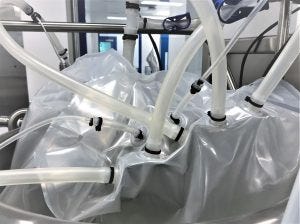
Novel R&D approaches and the need for flexibility make single-use key in tackling COVID-19Novel R&D approaches and the need for flexibility make single-use key in tackling COVID-19
Manufacturers are unlikely to look to traditional stainless-steel systems when developing COVID-19 vaccines despite the very high doses potentially needed, says MilliporeSigma.

Manufacturers are unlikely to look to traditional stainless-steel systems when developing COVID-19 vaccines despite the very high doses potentially needed, says MilliporeSigma.
The list of biopharma companies rapidly developing vaccines is growing in response to the novel coronavirus (COVID-19) pandemic. Moderna Therapeutics has a messenger RNA (mRNA) in Phase I trials, Inovio Pharmaceuticals’ DNA vaccine entered human trials last week, while others including Novavax, which is developing a vaccine based on its recombinant protein nanoparticle platform, are racing towards the clinic.
If and when these programs progress, the clinical and commercial manufacturing platforms will be supported by single-use equipment and systems, according to Andrew Bulpin, head of Process Solutions at MilliporeSigma.

“Most of the leading Covid-19 vaccine programs are using novel approaches, including mRNA, DNA vaccine, and vectors. These platforms have been largely built on single-use technologies,” he told Bioprocess Insider.
Vaccines aimed at treating high patient populations, for example controlling a pandemic, require millions if not billions of doses. Traditionally, large stainless-steel fermenters would be needed to for commercial supply. But while scale-up to very high dose volumes expected for COVID-19 vaccines might be a concern, manufacturers are unlikely to implement traditional stainless-steel systems in these processes, Bulpin said.
“There is much uncertainty around the occurrence of COVID-19 outbreaks and lasting immunity. Hence, there is a need for long-term vaccination, and establishing stainless steel facilities and systems require significant investment, with no guaranteed demand,” he told us.
“Single-use equipment is flexible and can quickly be put in place at a lower cost than traditional stainless-steel equipment, which is key for emerging countries and outbreaks such as COVID-19 that threaten long-term market opportunity.
“Rapid scale-up and GMP manufacturing also allow many manufacturers to leverage their existing capacity versus build new suites.”
Manufacturers using single-use are also better positioned to overcome challenges, like contamination, he added. “Single-use equipment was a large trend in the industry before COVID-19 and we expect that trend to gain even more traction post-pandemic.”
Customer support
Like other bioprocess vendors, MilliporeSigma is supporting COVID-19 vaccine and therapy researchers and developers directly.
“The products, services and expertise we provide, such as readily deployable biomanufacturing platforms and biosafety testing services, will help manufacturing at scale to address this pandemic,” said Bulpin. One example given is a customer using MilliporeSigma’s lateral flow membranes in the development of diagnostic test kits for COVID-19.
But also like others, MilliporeSigma must continue its critical operations across multi-regional restrictions and heavily increased precautions aimed at containing the virus.
“MilliporeSigma is monitoring the situation closely and has established protocols and guidelines to minimize the impact, whenever possible, to our employees, our sites and our supply,” said Bulpin.
“We have not experienced any significant disruptions. We have mobilized to deliver essential products and ensure minimal disruption to our supply chain with efforts that include regimented cleaning schedules, installing water systems, identifying replacements for backordered products, implementing redundant inventory in our distribution centers and reviewing warehouse strategies to accommodate for locally enforced measures.
“As a company dedicated to solving tough problems and accelerating access to health, we are committed to providing researchers and organizations with the necessary products and services that can aid the COVID-19 response while ensuring business continuity to supply our customers in all markets, ensuring that our customers have the products and services they need to serve the health needs of a global population.”
About the Author
You May Also Like
schedl_b_and_w.jpg?width=100&auto=webp&quality=80&disable=upscale)
schedl_b_and_w.jpg?width=400&auto=webp&quality=80&disable=upscale)



